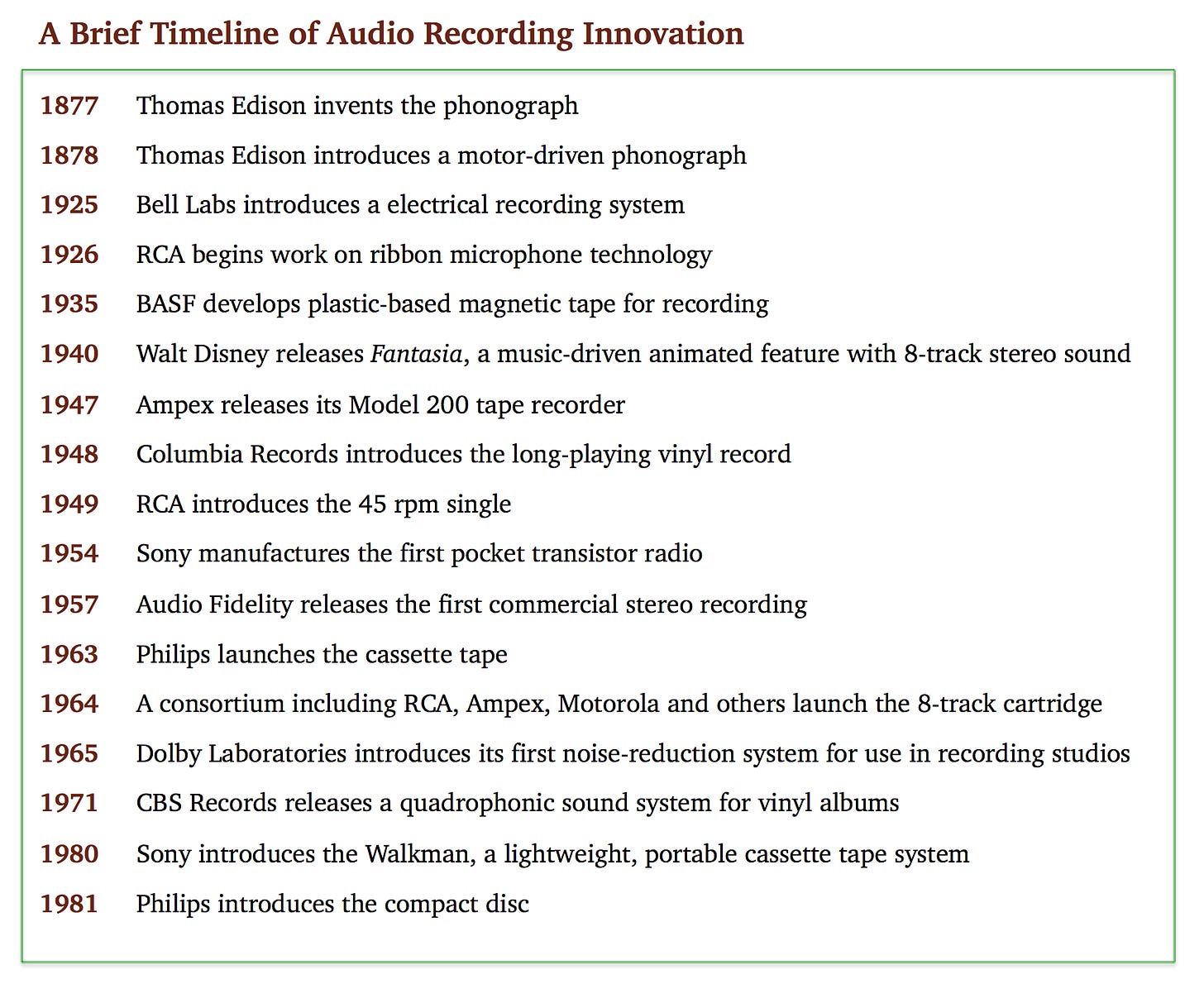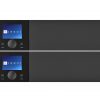I.
I have often made enthusiastic comments about the opportunity to revitalize the music business with Super Vinyl.
But what exactly is Super Vinyl? Am I just blowing smoke? And what kind of smoke, exactly?
I haven’t given a precise definition, because it’s more a dream than an actual product. But it’s a realistic dream. Millions of music fans have embraced old vinyl, creating the fastest-growing segment of the recording industry. So why can’t you make something like vinyl, only better?
Let me remind you that the vinyl long-playing album was invented in 1948. Surely we can do something better nowadays, with all our advanced technology. I share more details below, but the basic concept is a physical object that retains all of the advantages of the old albums we love and cherish, but with improvements and enhancements.

The upside is enormous. If music companies could shift the basis of competition back to a physical medium, the high tech streaming platforms are at a huge disadvantage, and power returns to musicians and record labels. They would have an edge that Silicon Valley technocrats couldn’t match.
Fans would benefit too. They deserve something better than a world in which songs are treated as ‘content’ for a phone app. It’s clear that Google, Apple and other tech titans have different priorities than enriching the listening experience of music lovers. We have already waited too long for them to meet our needs, and just look at how little they’ve done. In fact, that’s one of the main reasons why old vinyl is a hot product again.
If a Super Vinyl product were compelling enough, large numbers of music fans might willingly pay $10 or $20 for a new album, perhaps much more. This would create revenue and profit growth that the music business hasn’t enjoyed since the compact disc boom of the 1980s.
Let’s do the math.
Assume that an exciting new music platform could attract 10% of US consumers, and each was willing to purchase one album per month at a price of $15. And let’s make a conservative guess that demand outside the US is t least equal to this.
How much revenue does this generate? Here’s my back-of-the-envelope calculation.

In other words, musicians would make an additional $1.6 billion per year. (And if they sell Super Vinyl albums themselves at gigs, that number could be much, much higher—because they would capture most of the profits, probably in excess of ten dollars per unit.) The entire recording industry almost doubles in size as a result of this. And the whole music ecosystem is less reliant on Silicon Valley technocrats to reach an audience.
Okay, I just pulled those numbers out of thin air. I didn’t do focus groups or surveys. And if you disagree with my assumptions, you can plug in your own figures.

But whatever reasonable numbers you plug in, the bottom line remains clear and unambiguous. If a new physical medium gained even modest market penetration, it would completely transform the financial situation for musicians and the entire recording business.
So it hardly matters if musicians don’t get a full 15% royalty, or if the price of the Super Vinyl album is a little more or less than $15. Those changes in the underlying assumptions don’t alter the transformative impact of the innovation.
The only real question is: Can we create a physical medium for music that will genuinely excite consumers?
II.
Some people tell me that you can’t really add much to the existing vinyl experience. It ain’t broke, so don’t fix it.
I believe they have misjudged matters. Back in the day, I gave an amusing presentation to business execs about innovation, in which I aimed to prove that every product and service can be improved, no matter how boring or old. To make my point, I deliberately focused on banal products, such as soap, toothpaste, water, razors, etc.
How easy is it to create an exciting new razor? Are you aware that King Gillette—founder of the company that bears his name—filed the original patents on his breakthrough safety-razor-and-blade technology in 1904, and that those patents expired in 1921?
In other words, Gillette has been forced to come up with new, improved shaving platforms for more than a hundred years. And it has succeeded, despite tremendous satisfaction with the old razors.
When you look at the timeline, it seems absurd. But…

This is the kind of thinking that the music industry once possessed. Even if it’s good, we can still improve it, then do it again. The record labels undertook relentless R&D, and came up with a new improved audio format every decade or so. But then they stopped.
They didn’t stop because there was no more room for improvement. Record labels stopped investing in R&D because compact discs made them rich, and they got fat, dumb, and happy. They didn’t want the CD ever to go away.

Of course, change never really stops, but after the CD almost every major innovation came from outside the traditional music business—via Napster, Apple, Google, Spotify, etc. Major labels gave up on R&D for reasons that are still unclear. Perhaps, as I’ve hinted, just from laziness or incompetence—but the result was a tremendous shift of power from Southern California, epicenter of the entertainment business, to Northern California, the breeding ground for technocracy.
Those two locales are just a one-hour flight apart, but the difference in mindset could hardly be more pronounced.
As a result, new developments in audio tech during the last 30 years have been driven by a jumble of competing motives, most of them having little to do with enhancing the music ecosystem or listening experience. These ‘breakthroughs’ have generated profits for Silicon Valley, but collapsed the price structure of the recording business. Inflation-adjusted spending on music is still lower today than it was in the last century, and it’s not even close. Fan passion and loyalty are harder to measure, but it’s reasonable to conclude that they have tracked downward in the same direction.
Anyone who looks at what Gillette did with razors will realize instantly that there’s untapped potential for innovation in how we listen to music—which is far more multidimensional and emotionally charged than the shaving experience.
An LP, after all, is just another data storage medium, and advances in that field since the 1940s are monumental. The idea that the fastest-growing category in music is a 75-year-old technology ought to be an embarrassment. We can do better, much better.

The music business still has some residual experience and know-how in the manufacture and distribution of physical objects. They are lucky that they didn’t lose all those skills—the vinyl revival is probably the only reason why they still possess any of this expertise. And these skills will provide record labels with competitive barriers if a new vinyl medium were to go mainstream.
But if we wait for Silicon Valley to launch a better physical medium, it will never happen. The entire ethos of the tech world is built on digital, not analog. Tech titans of the current day want to bypass physical objects, bricks-and-mortar, etc. Those things aren’t sufficiently scalable (if I can borrow one of their favorite buzzwords). They don’t know about businesses involving physical objects. They can’t dominate them. (For example, did you notice that Amazon just shut down all its bookstores?—that’s a business they simply couldn’t figure out.) And that blind spot in the tech worldview is all the more reason for musicians and record labels to invest in songs you can hold in your hand.
The prevailing obsession with virtual products has led to absurd situations—for example, an economic environment in which billions are invested in non-fungible tokens of bored apes, but nothing in an improved physical medium for music. In fact, just last week, Universal Music spent $360,817 to purchase an ape NFT to lead a virtual music group.
In a different world, Universal Music would develop its own music tech, and not settle for a goofy simian simulacrum.
III.
What innovations could a Super Vinyl technology offer? Here’s a start:
- Audio quality superior to traditional vinyl.
- More resistant to scratches, surface noise, etc.
- More environmentally friendly.
- The playback equipment should be cool and exciting, with both analog and digital capabilities—think of it as a turntable on steroids.
- Playback device has a high-def display screen, with varied uses (music videos, information on the band, montage of photos from the session, or just an image of the album cover if that floats your boat).
- Album purchase comes with digital extras—access codes to download cool stuff (let your imagination run wild).
- The packaging possesses a high quality external appearance, enhancing the medium as a collectible and making each album an attractive display item on a collector’s shelf.
- Super Vinyl albums are easy to store, and more resistant to temperature change than traditional vinyl.
- All albums numbered, so fans can brag about how early their copy is in the production run.
- The first one hundred owners have their name—or an alias, if they prefer—listed in an elite online registry. That listing can be updated via a code included with the packaging, and thus registry status can be transferred whenever the physical album is resold. Additional perks (concert tickets, backstage pass, etc.) might come with registry membership. Consider this as a musical equivalent of premier status on an airline.
- The first produced album for each Super Vinyl release is treated as a high-end collectible, almost like an art object, and sold at a price befitting its unique status. These can be marketed as the analog equivalents of collectible NFTs.
- Etc. etc.
I could add more here about non-fungible tokens, but I know from past experience what a hornet’s nest of disputation arises every time I deal with that subject. I don’t really want to revisit those debates (although, for those interested, my views on NFTs can be found here). Let me simply say, in the context of Super Vinyl, that every business opportunity related to NFTs could also be developed as an add-on for a physical album.
The concepts laid out here aren’t a pipe dream. This is a very solid and pragmatic business plan. And it represents the best way I know to (1) grow the music industry, (2) imp
rove the financial stakes of musicians, (3) enhance the listening experience for music lovers, and (4) take control of recordings away from enormous tech corporations, returning it to people who genuinely care about music.
All it takes is time, money, and a modicum of visionary leadership. Is that too much to ask for? Please tell me that those haven’t disappeared completely from the music industry. Will someone with power and influence in the recording business please step up to the plate and start taking steps to make this happen? Even better, will a group of respected leaders in the music field come together to work as a team on this project? I know I’m not alone in making this request. Many of us in the music ecosystem are ready and willing to give our support.
Ted Gioia is a leading music writer, and author of eleven books including The History of Jazz and Music: A Subversive History. This article originally appeared on his Substack column and newsletter The Honest Broker.







































Noam B.
April 21, 2022 at 3:18 pm
Nice idea…but I think if there were any consumer support for a new physical format (big if), it wouldn’t look anything like vinyl.
Metalhead
April 21, 2022 at 4:33 pm
I have no idea of the viability but cannot think of any major criticism of this treatise.
I definitely like the way you think, This article is very well thought out to this reader.
Count me in as I just paid 80 bucks for Mirrorball by Sarah on AP vinyl. If I could have AP or Mofi quality vinyl for 15 or 20 bucks I am ALL IN. (and forget the downloads and video for this dinosaur although I am sure the kids would love the additional content)
Fun and interesting read.
errol
April 24, 2022 at 1:16 pm
are you serious? there are so many problems with this that it may as well be glowing…
Steve H
April 21, 2022 at 7:44 pm
The actual market for what you describe is about 100 times less. So for the 200,000 viable acts in the world that would mean about $81 per act on average.
Terry Moran
April 21, 2022 at 11:12 pm
Congrats on inventing the Compact Disc
Cin
April 22, 2022 at 4:04 am
Damn you for stealing my reply!
ORT
April 22, 2022 at 1:46 am
I have not read any thing quite as patently (and I mean this) stupid as this since that idiot “Darko” tried calling any integrated amp with an internet tuner a “super integrated” and oh what a maroon that doofus is! Yes, I THINK the entire premise and the article posturing it are either meant to be April Fool’s Day humor come late or future fAdCopy (FapCopy?) for the frAudiophile set, aka the mentally slothomoric.
Good lord! No one neeeeeeeeeeeeeeds “super vinyl” and those that claim to want it or rather what ever it is or will be, will NOT buy it but instead ridicule it for what it is not. Which is to say, some thing they will actually pay for.
This “article” is not writing, it is TYPING. Which is what frAudiophiles do. Ridiculous. I loathe frAudiophiles. Despise them really with their pathetic holier than thou frattitudes, the lot of them.
I can not even write, let alone say “super vinyl” with out laughing out loud. It has been said that while smart people have the brains, stupid people have the balls. Too bad that their testes will never drop.
“super vinyl”…*SNICKER*
ORT
Cin
April 22, 2022 at 4:06 am
Well that’s the stupidest thing I will read on the Internet today …. super vinyl. You know if you make it really super super super what it will sound like? … CD
errol
April 24, 2022 at 1:15 pm
good lord. i can only imagine you struggling with simple tasks like breathing, after writing something so stupid
“The upside is enormous. If music companies could shift the basis of competition back to a physical medium, the high tech streaming platforms are at a huge disadvantage, and power returns to musicians and record labels.”
yeah, and if my mom grew wheels she’d be a fuckin go kart. this is all wishful thinking that ignores the hows and whys of what brought the music industry to its current state. its also worth noting that the labels enjoy a very close, and profitable relationship with streaming services, and have zero intentions of shaking that up on account of the almost non existent overhead that streaming platforms provide. couple this with the fact that most young people now view music as a commodity to be cheaply consumed, and there is zero chance of this plan working whatsoever. very, very stupid.
Ian White
April 24, 2022 at 5:52 pm
I’m going to put you down as a “no” on this one.
Best,
Ian White
Metalhead
April 25, 2022 at 6:00 pm
Welcome to the naysayers.
Have you actually purchased super vinyl formulations from Mobile Fidelity or listened to one step vinyl records? Have you listened to AP titles on 45 rpm.
I am a happy digital user and enjoy the Hell out of my Esoteric player and have mirrorball on compact disc. I purchased the AP vinyl as I believe it will clobber the cd, but if it doesn’t it only affects my wallet and not yours.
Naysay all you want but the vinyl market is real and I don’t believe that looking into ways to improve vinyl formulations and reducing costs makes it very far from stupid
Good God go back to your mp3’s and cd’s and stay away from vinyl if your not interested.
l.
May 11, 2023 at 2:16 am
My 15 year old daughter bought an old sony cd player and is buying old cds online. She likes the idea of having a physical collection of her favorite music. She also likes the album art and the aesthetic appeal of displaying the CDs on a shelf in her room.